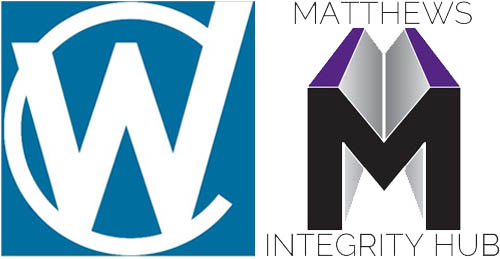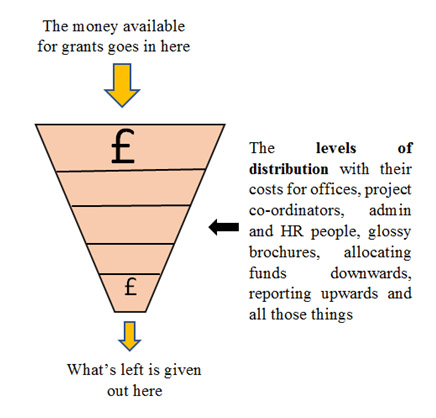OUR SEARCH FOR FUNDING
in the asset integrity industry
Is the integrity industry a special case for funding?
When we started discussing this this amongst the contributors of Matthews Integrity Hub: HEAD OFFICE, we had to conclude that, between us, we really didn’t know. When running previous training businesses, we had had a few delegates on training courses who had obtained partial funding through educational or industry schemes but there weren’t a large number. One of our contributors had previous experience of a government funded R&D programme in his company and another had got involved with an EU project where partial funding was provided but, all-in-all external funding hadn’t played a significant part in any of our businesses. Things got a bit tense when someone suggested that maybe we had missed out on something.
So, we decided to do some research, so we could pass our findings on to you.
Here was Our Task: Could we find out if it is worth trying to get funding, of any sort, to support us in the parts of the integrity business we are in. Before you read our story, it makes sense to read our accompanying article The Principles of Free Money, to set the scene.

Here’s what we did
First, we divided the search into four sectors, all relating to the asset integrity industry;
- Funding for employment or training purposes
- Funding to assist with marketing and selling activities
- Funding to help buy capital assets like equipment and machinery
- Funding to help us bid for big contracts
To keep a level playing field, we decided not to eliminate or differentiate between any types of funding. We lumped awards, full grants, partial grants, small loans, big loans, venture/equity capital and others all into the same ‘how can we get some of this action?’ category. A bit unrealistic maybe but, as you will hear, it turned out not to make a lot of difference. Four of our website contributors each took charge of one the four sectors and off we went to search the web.
Prepare to be impressed
Not to be outdone, our search inventory topped out at a grand total of 234 websites spread over 6 weeks comprising
- 63 UK direct or indirect Government or government-linked sites
- 32 sites linked in some way to the EU
- 40 from various Engineering Institutions, associations and similar eminently respectable bodies
- 19 from pure financial/lending organisations like banks
- 12 from venture/equity capital providers (we’d got the picture by then)
- 68 from what we decided to call ‘business support organisations’ advising, assisting, managing, co-ordinating and offering other types of support to funding applicants.
Our Integrity Industry brief
We stuck as best we could to trying to find out what funding these sites could offer individuals or companies in the integrity industry involved in design, materials NDE, inspection, damage investigation, code knowledge, integrity evaluation and the like. Without boring you too much here are some of the specific criteria we agreed on in making our enquiries;
- We didn’t investigate funding for large capital investments > £250k (that’s a big investment)
- We specified that we were based in one of four locations; South Wales, Cambridge. Teesside or Aberdeen, depending on the specific enquiry we made
- We didn’t claim a massively impressive individual or (for companies) business track record but confirmed we were solvent and could point to 5 years of individual employment or reasonable business performance in the integrity industry. As individuals we explained that we were keen to learn, and better ourselves
- We were prepared to fill in first-stage/general online applications (and make telephone calls) to see how things worked but not to progress to the point of misrepresenting ourselves or wasting too much of peoples’ time.
Over the period, we sent a total of 460 e-mails, made 182 initial and follow-up phone calls and filled in 75 online forms. That we thought, should be enough to give us the picture, even if it was a big picture, of what funding opportunities are actually out there. The effective cost, by the way, assuming we were all charging ourselves out to ourselves at a professional rate your accountant would charge, say £200 per hour, came to just under £36000.
So, we hear you asking; WHAT DID YOU FIND?
Please appreciate the difficulty we have in distilling all the results and findings down to a couple of pages. We learnt a huge amount but can’t justify doing a 32-page report with graphs and pie charts. Nevertheless, we’d like to pass on what we think are the main messages. Please don’t interpret them as being either bullish, unrealistic or negative; they are just an honest summary of what we believe we found. Here we go:
Do you fit the right business classification?
Most funding schemes seem to be organised around the basis of business classifications. The UK has a government-recognised list of standard industry classifications (see http://resources.companieshouse.gov.uk/sic/ ) and funding organisations often have their own compilations made up from this list. For example SIC 28910 manufacture of machinery for metallurgy may be combined with others from the SIC list to form the industry sector of specialist manufacturing machines.
We found the loan and equity financers in particular heavily influenced by this sectorisation of businesses in where their funding is to be used. The difficulty is that the funding profile of lenders etc is not necessarily obvious. It is often hidden in the undergrowth at high-management level; and even the front-line people receiving funding applications may not know.
Ultimately, we found that if you apply for funding (any type) and you are in the ‘wrong’ business classification for the funding organisation, then your chances of success will be slim. What was frustrating was that we made three applications where we only received rejection on the basis of ‘it’s not our business sector ‘after two rounds of timewasting discussion. You have to be careful not to get caught by this.
The Integrity industry is not special (at all)
We found no government-guided funding provisions for the integrity industry specifically targeted at the integrity industry, at least at the operating level. With all the funding sources we pursued it was necessary to reclassify it as broad sector e.g. ‘Oil & Gas’ or ‘Nuclear’ before we got much recognition as to what the activity was all about. We tried to emphasise the ‘safety’ angle but in about half the cases we just ended up under the category of ‘other technical services’.
This drew us to the conclusion that in the eyes of funding organisations the integrity industry is not special (at all)
The upside-down funding triangle
After a while looking at grant funding (particularly for training) we started to see how this grant funding thing might work. When you apply for a training grant, you are not talking to the people who have sanctioned the money, you are dealing with people who have had funds sanctioned to them from a higher source. If you could go directly to this higher source (you can’t), you would find the same thing; it’s not their money, it’s been sanctioned to them by an even higher source, the next level up the triangle. And so it goes on; a typical hierarchy might be: The EU to Central Government to Regional Government to Regional development agency to local development agency to ‘funding scheme contractor’ and finally to you.
In this case, that’s a total of six steps, forming the upside-down funding triangle, with the applicant at the bottom. Here’s the triangle below.
We didn’t burden the good folks we visited with discussions on the existence of the triangle, but we reckoned the money for their salaries, offices and glossy brochures had to be coming from somewhere.
The funding triangle with its multiple levels is one reason grant funding is always severely limited. It’s also why, if you are successful in getting a grant, there is so much reporting and accountability upwards, to feed the accountability-hunting levels of the triangle.
Give us some money and we’ll lend it back to you
Hard facts are all you need here.
Matthews Integrity Hub: HEAD OFFICE’s most diplomatic and convincing website contributor tried her persuasive best to get an offer for an unsecured loan for £10,000 from 6 well-known banks and funding sources. It was supposedly for ‘working capital’ for an emerging plant inspection business. Filling in six forms resulted in three face-to-face meetings, all of which resulted in …nothing at all.
We are simple people here. We concluded that if you are seeking a loan for legitimate business or self-improvement purposes then lenders of anything above a nominal sum (say £2000) will want security against property, business assets or anything else you have worth significantly more than the value of the loan plus interest. So would you if you were a lender.
Part-funded training
This had quite good results. We found that some genuine training grants were available but there were strict criteria as to the types of training that we could get funding for. It wasn’t quick getting a plant inspection or integrity assessment training course accepted because we first had to educate the funding agency as to what it was all about. They had no easy ‘classification’ to fit it into. Once we’d felt the way forward with a few of these agencies we decided that chances of success are governed by:
Are you the right age? We sensed that up to 25 or over 45 seemed to be what they were looking for, but of course they couldn’t tell us that.
Is the training course ‘approved’ by them? (back to the quirks of the upside-down funding triangle)
Are you in the right regional area?
How much you apply for. We heard the ‘under £2000’ figure mentioned several times so there must be something in it.
Your tolerance and persistence; there are a lot of online forms to fill in and you need to use them to educate the agency about the training course and its industry application. You will find patience helpful.
In general, a positive result.
 Thank goodness for awards and prizes
Thank goodness for awards and prizes
This turned out weird. The more digging we did the more it seemed that organisations offering awards and prizes actually have difficulty in getting people to apply for them, the complete opposite to the situation with grants.
Wonderful stuff. We sent off applications for 12 awards and prizes in the engineering industry and got 12 good responses. The problem was that they all required detailed and relevant CVs, project summaries, claims of technical grandeur and other things we couldn’t realistically provide. The reason was that the awards were not close enough to our skills and profiles in the integrity industry to be relevant. Try as we might, we couldn’t find any specifically for the integrity industry to give it a realistic go. The message is still clear though:
- Look for awards and prizes near your area of competence and APPLY FOR THEM: you will stand a better chance than you think
- To help you, first have a look at our How to apply for grants article; it’s not what you think.
Fantasy funding
Sadly, we found a lot of these. They’re vital business support services or professional middle-men and hangers-on depending on your viewpoint. They don’t have any money available to pass to you, but would like you to pass some of yours to them, in various clever ways
You have to delve into some ‘funding’ websites carefully to get the true picture but we found some that were little more than fronts for accountants, solicitors, banks’ marketing departments, software sellers, statistic-collectors and resellers, franchise-merchants, invoice factors (short term lenders) and general advisers and hand-holders.
We suggest you watch out for these.
Thank You
A big thank you to our website contributors at Matthews Integrity Hub: HEAD OFFICE who put in all the hard work and motorway miles in this project. We are still adding up their expense claims.
Please check out our Funding Factsheet
We’ve listed some useful funding-related sites on our funding factsheet . We are nothing to do with any of these sites so can’t vouch for their content, but we found then amongst the most sensible ones that we got involved with.
Can we help you further?
We’d love to. We are not part of any government body, association, institution, funding agency or employer. Nor do we officially represent any of them, so you can be assured that we can provide you with an objective viewpoint. We can’t comment on individual organisations of course but are happy to discuss our experiences or queries that you have.
Matthews Integrity Hub: HEAD OFFICE is OPEN EVERY DAY….0730 – 2200 Monday – Sunday…That’s correct, all week, every week, including holidays
 If we happen to miss your call, leave a message and we will call you back just as soon as we pick it up. Sorry, there’s no automated messages, call queueing, voice recognition tools or canned music. Try it and see.
If we happen to miss your call, leave a message and we will call you back just as soon as we pick it up. Sorry, there’s no automated messages, call queueing, voice recognition tools or canned music. Try it and see.
CONTACT US
Tel: 07746 771592 help@matthewsintegrity.co.uk






